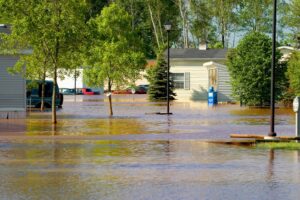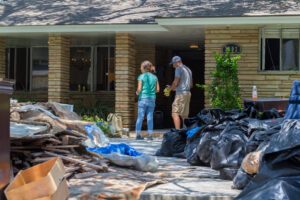Personal Flood Insurance
Floods are problematic for more than just waterfront homeowners. Occurring more often than tornadoes, earthquakes or hurricanes, the National Flood Insurance Program (NFIP) estimates that even one inch of water in your home can cause up to $7,800 of flood damage. Because a standard homeowner’s insurance policy does not cover flood damage, it’s important to protect your assets from potential devastation.
An Acentria flood insurance policy can cover flood-related damages, including:
- Structural damage
- Water heater, air conditioner and furnace
- Flood debris clean-up
- Floor surfaces (carpeting and tile)
- Valuable contents (furniture, clothing, jewelry and artwork)
Flood insurance isn’t just for homes in high-risk areas; every home is located in a flood zone. According to the Federal Emergency Management Agency (FEMA), all 50 states have experienced floods or flash floods in the past five years. And these floods can happen quickly; flash floods can occur within minutes of excessive rainfall, dam or levee failure, or a sudden release of water held by an ice jam. While anyone is vulnerable to flood damage, certain areas carry a greater risk. If you live in a low-lying area, near water, behind a levee or downstream from a dam, you must take extra precautions to ensure protection with flood insurance coverage. Even small streams, canals, creeks, culverts, dry streambeds or low-lying ground can cause a flood.
After purchasing flood coverage, you should build an emergency kit and make a family communications plan (please contact Acentria if you would like an emergency kit checklist or a sample family communications plan). If you’re building a home, it’s best to avoid building in a flood plain – but if that’s not possible, reinforce your home and elevate the furnace, water heater and electric panel. To prepare for a flood you should also consider installing “check valves” to prevent floodwater from backing up into the drains of your home. If feasible, construct barriers to stop floodwater from entering the building and seal walls in basements with waterproofing compounds.
If a flood is in your area, you should keep a radio or television close by for up-to-date information. Because flash flooding can occur unexpectedly, you should move to higher ground immediately if there is any possibility of occurrence and ensuing flood damage. Stream, drainage channels and canyons are all areas that may flood suddenly – even without typical warnings, such as rain clouds or heavy rain.
If you must prepare to evacuate due to a flood, follow these subsequent steps:
- Secure your home and move essential items to an upper floor. If you have time, bring in outdoor furniture
- Turn off utilities at the main switches or valves if instructed
- Disconnect electrical appliances; do not touch electrical equipment if you are wet or standing in water
- Avoid walking through moving water, as even six inches can make you fall. If you have to walk in water, walk where the water is not moving, using a stick to check the ground’s firmness in front of you
- Avoid driving into flooded areas. If floodwaters rise around your car, abandon the car and move to higher ground if you can do so safely
- Do not camp or park your vehicle along streams, rivers or creeks – particularly during threatening conditions
Use local alerts and warning systems to get up-to-the-minute information and advice. Stay away from moving water, flooded or barricaded roads and damaged areas (unless your assistance has been requested by police, fire or relief). Return home only when authorities indicate it is safe. Above all, play it safe. If you must walk or drive in flooded areas, exercise extreme caution as floods can cause eroded roads, crumpling building foundation and electrically charged standing water. Assume that everything wet is polluted; floodwater may be contaminated by oil, gasoline or raw sewage. You should always listen for news reports to determine when your water is safe to drink. Contact our dedicated CLAIMS department if you need to file a flood claim or have questions on a claim you’ve already filed as an Acentria flood insurance policyholder.
Take the Next Step
Floods can cause physical hazards and emotional stress for you and your family. At Acentria, it’s our goal to help you feel prepared and safe through our premium flood insurance policies. Let our team of professionals help you find optimal flood coverage for your home. Get started today!
Thought Leadership

Flooding Happens Everywhere: Why Flood Insurance Matters
Flooding is one of the most frequent and costly natural disasters in the United States, according to the Federal Emergency Management Agency (FEMA). What makes

Essential Tips for What to Do After a Hurricane
With hurricane season in full swing, knowing what to do after a hurricane is essential. The immediate aftermath can be overwhelming and knowing where to

Dog Bite Liability Insurance and Prevention Tips
Sharing your home with dogs can be a delightful and rewarding experience, often providing you and your family with company and comfort while encouraging you



















